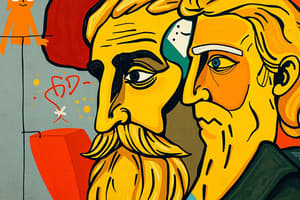Podcast
Questions and Answers
What is the primary aim of Module No. 1?
What is the primary aim of Module No. 1?
To understand the construct of the self from various disciplinary perspectives.
Which philosophers are mentioned in the study guide?
Which philosophers are mentioned in the study guide?
- Socrates (correct)
- Descartes
- Hume
- Plato (correct)
Socrates believed that knowing oneself is not important.
Socrates believed that knowing oneself is not important.
False (B)
What method is associated with Socrates for understanding subjects?
What method is associated with Socrates for understanding subjects?
Plato believed in a tripartite soul consisting of the appetitive, spirited, and ______.
Plato believed in a tripartite soul consisting of the appetitive, spirited, and ______.
What does Socratic wisdom entail?
What does Socratic wisdom entail?
According to St. Augustine, what is the purpose of the immortal soul?
According to St. Augustine, what is the purpose of the immortal soul?
Flashcards are hidden until you start studying
Study Notes
Ancient Philosophers
- Socrates emphasized knowing oneself, stating "An unexamined life is not worth living."
- The Socratic Method encourages understanding through questioning.
- Socrates believed in the dualism of reality, with an imperfect, changeable body and a perfect, unchanging soul.
- Plato supported Socrates' ideas but expanded upon the soul, describing three parts: the appetitive soul, the spirited soul, and the mind (nuos).
- The appetitive soul governs desires, pleasure, and basic needs.
- The spirited soul manages emotions like love, anger, and ambition.
- The mind, as the superior component, controls the self and fosters justice and virtue.
- St. Augustine adapted both Socrates and Plato's dualism, aligning it with Christian belief.
- The physical realm, represented by our body, is imperfect.
- The ideal realm is achieved through faith and reason, with the physical world serving as a proving ground for eternal destinies.
- Self-development involves self-presentation and self-realization.
Modern Philosophers
- Rene Descartes is the father of modern philosophy, proposing the idea of "Cogito, ergo sum," meaning "I think, therefore I am." This signified that self-awareness is fundamental to existence.
- John Locke argued that the mind at birth is a "tabula rasa," a blank slate. He believed experience shapes our thoughts and self-identity.
- David Hume challenged the notion of a fixed self, suggesting it's a bundle of perceptions, constantly changing and lacking a stable core.
- Immanuel Kant reconciled rationalism and empiricism, asserting that reason and experience contribute to human understanding. He proposed the categorical imperative as a universal moral principle, guiding ethical behavior.
Studying That Suits You
Use AI to generate personalized quizzes and flashcards to suit your learning preferences.




